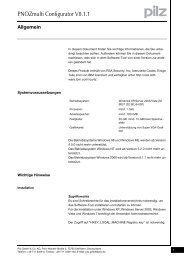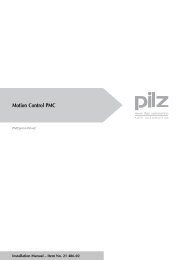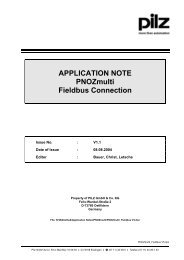- Page 1 and 2:
Decentralised I/O system and contro
- Page 3 and 4:
Contents Contents 1.0 2011-04 Syste
- Page 5 and 6:
Contents Order reference 6.1 Standa
- Page 7 and 8:
System environment A basics System
- Page 9 and 10:
System environment A basics System
- Page 11 and 12:
System environment A basics System
- Page 13 and 14:
System environment A basics System
- Page 15 and 16:
System environment A basics System
- Page 17 and 18:
System environment A basics System
- Page 19 and 20:
System environment A basics System
- Page 21 and 22:
System environment A basics System
- Page 23 and 24:
System environment A basics System
- Page 25 and 26:
System environment A basics System
- Page 27 and 28:
System environment A basics System
- Page 29 and 30:
System environment A basics System
- Page 31 and 32: System environment A basics System
- Page 33 and 34: System environment A basics System
- Page 35 and 36: System environment A basics System
- Page 37 and 38: System environment A basics System
- Page 39 and 40: System environment A basics System
- Page 41 and 42: System environment A basics System
- Page 43 and 44: System environment A basics System
- Page 45 and 46: System environment A basics System
- Page 47 and 48: System environment A basics System
- Page 49 and 50: System environment B basics System
- Page 51 and 52: System environment B basics System
- Page 53 and 54: System environment B basics System
- Page 55 and 56: System environment B basics System
- Page 57 and 58: System environment B basics System
- Page 59 and 60: System environment B basics System
- Page 61 and 62: System environment B basics System
- Page 63 and 64: System environment B basics System
- Page 65 and 66: System environment B basics System
- Page 67 and 68: System environment B basics System
- Page 69 and 70: System environment B basics System
- Page 71 and 72: System environment B basics System
- Page 73 and 74: System environment B basics System
- Page 75 and 76: System environment B basics System
- Page 77 and 78: System environment B basics System
- Page 79 and 80: System environment B basics System
- Page 81: System environment B basics System
- Page 85 and 86: System environment B basics System
- Page 87 and 88: System environment B basics System
- Page 89 and 90: System environment B basics System
- Page 91 and 92: System environment B basics System
- Page 93 and 94: Modules Contents Page Selection gui
- Page 95 and 96: Modules Selection guide Contents Pa
- Page 97 and 98: Modules Selection guide Electronic
- Page 99 and 100: Modules Head modules Contents Page
- Page 101 and 102: Modules Head modules PSSu H SB(-T)
- Page 103 and 104: Modules Head modules PSSu H SB(-T)
- Page 105 and 106: Modules Head modules PSSu H SB DP(-
- Page 107 and 108: Modules Head modules PSSu H SB DP(-
- Page 109 and 110: Modules Head modules PSSu H SB DN(-
- Page 111 and 112: Modules Head modules PSSu H SB DN(-
- Page 113 and 114: Modules Head modules PSSu H SB CAN(
- Page 115 and 116: Modules Head modules PSSu H SB CAN(
- Page 117 and 118: Modules Head modules PSSu H SB CAN(
- Page 119 and 120: Modules Head modules PSSu H SB IBSe
- Page 121 and 122: Modules Head modules PSSu H SB IBSe
- Page 123 and 124: Modules Head modules PSSu H SB IBSo
- Page 125 and 126: Modules Head modules PSSu H SB IBSo
- Page 127 and 128: Modules Head modules PSSu H DP(-T)
- Page 129 and 130: Modules Head modules PSSu H DP(-T)
- Page 131 and 132: Modules Head modules PSSu H DN(-T)
- Page 133 and 134:
Modules Head modules PSSu H DN(-T)
- Page 135 and 136:
Modules Head modules PSSu H CAN(-T)
- Page 137 and 138:
Modules Head modules PSSu H CAN(-T)
- Page 139 and 140:
Modules Head modules PSSu H IBSe Mo
- Page 141 and 142:
Modules Head modules PSSu H IBSe No
- Page 143 and 144:
Modules Head modules PSSu H IBSo Mo
- Page 145 and 146:
Modules Head modules PSSu H IBSo Te
- Page 147 and 148:
Modules Head modules PSSu H F PN Mo
- Page 149 and 150:
Modules Head modules PSSu H F PN No
- Page 151 and 152:
Modules Head modules PSSu H S PN Mo
- Page 153 and 154:
Modules Head modules PSSu H S PN No
- Page 155 and 156:
Modules Head modules PSSu H FS SN S
- Page 157 and 158:
Modules Head modules PSSu H FS SN S
- Page 159 and 160:
Modules Head modules PSSu H FS SN S
- Page 161 and 162:
Modules Head modules PSSu H FS SN S
- Page 163 and 164:
Modules Head modules PSSu H PLC1 FS
- Page 165 and 166:
Modules Head modules PSSu H PLC1 FS
- Page 167 and 168:
Modules Head modules PSSu H PLC1 FS
- Page 169 and 170:
Modules Head modules PSSu H PLC1 FS
- Page 171 and 172:
Modules Head modules PSSu H PLC1 FS
- Page 173 and 174:
Modules Head modules PSSu H PLC1 FS
- Page 175 and 176:
Modules Head modules PSSu H PLC1 FS
- Page 177 and 178:
Modules Head modules PSSu H PLC1 FS
- Page 179 and 180:
Modules Head modules PSSu H PLC1 FS
- Page 181 and 182:
Modules Voltage supply Contents Pag
- Page 183 and 184:
Modules Voltage supply PSSu E F PS(
- Page 185 and 186:
Modules Voltage supply PSSu E F PS(
- Page 187 and 188:
Modules Voltage supply PSSu E F PS(
- Page 189 and 190:
Modules Voltage supply PSSu E F PS(
- Page 191 and 192:
Modules Voltage supply PSSu E F PS(
- Page 193 and 194:
Modules Voltage supply PSSu E F PS1
- Page 195 and 196:
Modules Voltage supply PSSu E F PS1
- Page 197 and 198:
Modules Voltage supply PSSu E F PS1
- Page 199 and 200:
Modules Voltage supply PSSu E F PS1
- Page 201 and 202:
Modules Voltage supply PSSu E F PS1
- Page 203 and 204:
Modules Voltage supply PSSu E F PS-
- Page 205 and 206:
Modules Voltage supply PSSu E F PS-
- Page 207 and 208:
Modules Voltage supply PSSu E F PS-
- Page 209 and 210:
Modules Voltage supply PSSu E F BSW
- Page 211 and 212:
Modules Voltage supply PSSu E F BSW
- Page 213 and 214:
Modules Voltage supply PSSu E F BSW
- Page 215 and 216:
Modules Voltage supply PSSu E F BSW
- Page 217 and 218:
Modules Voltage supply PSSu E F BSW
- Page 219 and 220:
Modules Digital input/output (stand
- Page 221 and 222:
Modules Digital input/output (stand
- Page 223 and 224:
Modules Digital input/output (stand
- Page 225 and 226:
Modules Digital input/output (stand
- Page 227 and 228:
Modules Digital input/output (stand
- Page 229 and 230:
Modules Digital input/output (stand
- Page 231 and 232:
Modules Digital input/output (stand
- Page 233 and 234:
Modules Digital input/output (stand
- Page 235 and 236:
Modules Digital input/output (stand
- Page 237 and 238:
Modules Digital input/output (stand
- Page 239 and 240:
Modules Digital input/output (stand
- Page 241 and 242:
Modules Digital input/output (stand
- Page 243 and 244:
Modules Digital input/output (stand
- Page 245 and 246:
Modules Digital input/output (stand
- Page 247 and 248:
Modules Digital input/output (stand
- Page 249 and 250:
Modules Digital input/output (stand
- Page 251 and 252:
Modules Digital input/output (stand
- Page 253 and 254:
Modules Digital input/output (stand
- Page 255 and 256:
Modules Digital input/output (stand
- Page 257 and 258:
Modules Digital input/output (stand
- Page 259 and 260:
Modules Digital input/output (stand
- Page 261 and 262:
Modules Digital input/output (stand
- Page 263 and 264:
Modules Digital input/output (stand
- Page 265 and 266:
Modules Digital input/output (stand
- Page 267 and 268:
Modules Digital input/output (stand
- Page 269 and 270:
Modules Digital input/output (stand
- Page 271 and 272:
Modules Digital input/output (stand
- Page 273 and 274:
Modules Digital input/output (stand
- Page 275 and 276:
Modules Digital input/output (stand
- Page 277 and 278:
Modules Digital input/output (stand
- Page 279 and 280:
Modules Digital input/output (stand
- Page 281 and 282:
Modules Digital input/output (stand
- Page 283 and 284:
Modules Digital input/output (stand
- Page 285 and 286:
Modules Digital input/output (stand
- Page 287 and 288:
Modules Digital input/output (stand
- Page 289 and 290:
Modules Digital input/output (stand
- Page 291 and 292:
Modules Digital input/output (stand
- Page 293 and 294:
Modules Digital input/output (stand
- Page 295 and 296:
Modules 3.4 Pilz GmbH & Co. KG, Fel
- Page 297 and 298:
Modules Digital input/output (fails
- Page 299 and 300:
Modules Digital input/output (fails
- Page 301 and 302:
Modules Digital input/output (fails
- Page 303 and 304:
Modules Digital input/output (fails
- Page 305 and 306:
Modules Digital input/output (fails
- Page 307 and 308:
Modules Digital input/output (fails
- Page 309 and 310:
Modules Digital input/output (fails
- Page 311 and 312:
Modules Digital input/output (fails
- Page 313 and 314:
Modules Digital input/output (fails
- Page 315 and 316:
Modules Digital input/output (fails
- Page 317 and 318:
Modules Digital input/output (fails
- Page 319 and 320:
Modules Digital input/output (fails
- Page 321 and 322:
Modules Digital input/output (fails
- Page 323 and 324:
Modules Digital input/output (fails
- Page 325 and 326:
Modules Digital input/output (fails
- Page 327 and 328:
Modules Digital input/output (fails
- Page 329 and 330:
Modules Digital input/output (fails
- Page 331 and 332:
Modules Digital input/output (fails
- Page 333 and 334:
Modules Digital input/output (fails
- Page 335 and 336:
Modules Digital input/output (fails
- Page 337 and 338:
Modules Digital input/output (fails
- Page 339 and 340:
Modules Digital input/output (fails
- Page 341 and 342:
Modules Digital input/output (fails
- Page 343 and 344:
Modules Analogue input/output (stan
- Page 345 and 346:
Modules Analogue input/output (stan
- Page 347 and 348:
Modules Analogue input/output (stan
- Page 349 and 350:
Modules Analogue input/output (stan
- Page 351 and 352:
Modules Analogue input/output (stan
- Page 353 and 354:
Modules Analogue input/output (stan
- Page 355 and 356:
Modules Analogue input/output (stan
- Page 357 and 358:
Modules Analogue input/output (stan
- Page 359 and 360:
Modules Analogue input/output (stan
- Page 361 and 362:
Modules Analogue input/output (stan
- Page 363 and 364:
Modules Analogue input/output (stan
- Page 365 and 366:
Modules Analogue input/output (stan
- Page 367 and 368:
Modules Analogue input/output (stan
- Page 369 and 370:
Modules Analogue input/output (stan
- Page 371 and 372:
Modules Analogue input/output (stan
- Page 373 and 374:
Modules Analogue input/output (stan
- Page 375 and 376:
Modules Analogue input/output (stan
- Page 377 and 378:
Modules Analogue input/output (stan
- Page 379 and 380:
Modules Analogue input/output (stan
- Page 381 and 382:
Modules Analogue input/output (stan
- Page 383 and 384:
Modules Analogue input/output (stan
- Page 385 and 386:
Modules Analogue input/output (stan
- Page 387 and 388:
Modules Analogue input/output (stan
- Page 389 and 390:
Modules Analogue input/output (stan
- Page 391 and 392:
Modules Analogue input/output (stan
- Page 393 and 394:
Modules Analogue input/output (stan
- Page 395 and 396:
Modules Analogue input/output (stan
- Page 397 and 398:
Modules Analogue input/output (stan
- Page 399 and 400:
Modules Analogue input/output (stan
- Page 401 and 402:
Modules Analogue input/output (stan
- Page 403 and 404:
Modules Analogue input/output (stan
- Page 405 and 406:
Modules 3.6 Pilz GmbH & Co. KG, Fel
- Page 407 and 408:
Modules Analogue input/output (fail
- Page 409 and 410:
Modules Analogue input/output (fail
- Page 411 and 412:
Modules Analogue input/output (fail
- Page 413 and 414:
Modules Analogue input/output (fail
- Page 415 and 416:
Modules Analogue input/output (fail
- Page 417 and 418:
Modules Analogue input/output (fail
- Page 419 and 420:
Modules Analogue input/output (fail
- Page 421 and 422:
Modules Analogue input/output (fail
- Page 423 and 424:
Modules Analogue input/output (fail
- Page 425 and 426:
Modules Analogue input/output (fail
- Page 427 and 428:
Modules 3.7 Pilz GmbH & Co. KG, Fel
- Page 429 and 430:
Modules Serial interfaces (standard
- Page 431 and 432:
Modules Serial interfaces (standard
- Page 433 and 434:
Modules Serial interfaces (standard
- Page 435 and 436:
Modules Serial interfaces (standard
- Page 437 and 438:
Modules Serial interfaces (standard
- Page 439 and 440:
Modules Serial interfaces (standard
- Page 441 and 442:
Modules Serial interfaces (standard
- Page 443 and 444:
Modules Serial interfaces (standard
- Page 445 and 446:
Modules Counter modules (standard)
- Page 447 and 448:
Modules Counter modules (standard)
- Page 449 and 450:
Modules Counter modules (standard)
- Page 451 and 452:
Modules Counter modules (standard)
- Page 453 and 454:
Modules Counter modules (standard)
- Page 455 and 456:
Modules Counter modules (standard)
- Page 457 and 458:
Modules Counter modules (standard)
- Page 459 and 460:
Modules Counter modules (standard)
- Page 461 and 462:
Modules Counter modules (standard)
- Page 463 and 464:
Modules Counter modules (standard)
- Page 465 and 466:
Modules Counter modules (standard)
- Page 467 and 468:
Modules Counter modules (standard)
- Page 469 and 470:
Modules Counter modules (standard)
- Page 471 and 472:
Modules Counter modules (failsafe)
- Page 473 and 474:
Modules Counter modules (failsafe)
- Page 475 and 476:
Modules Counter modules (failsafe)
- Page 477 and 478:
Modules Counter modules (failsafe)
- Page 479 and 480:
Modules Counter modules (failsafe)
- Page 481 and 482:
Modules Counter modules (failsafe)
- Page 483 and 484:
Modules Counter modules (failsafe)
- Page 485 and 486:
Modules Counter modules (failsafe)
- Page 487 and 488:
Modules Counter modules (failsafe)
- Page 489 and 490:
Modules Voltage distribution Conten
- Page 491 and 492:
Modules Voltage distribution PSSu E
- Page 493 and 494:
Modules Voltage distribution PSSu E
- Page 495 and 496:
Modules Voltage distribution PSSu E
- Page 497 and 498:
Modules Voltage distribution PSSu E
- Page 499 and 500:
Modules Voltage distribution PSSu E
- Page 501 and 502:
Modules Voltage distribution PSSu E
- Page 503 and 504:
Modules Voltage distribution PSSu E
- Page 505 and 506:
Modules Voltage distribution PSSu E
- Page 507 and 508:
Modules Voltage distribution PSSu E
- Page 509 and 510:
Modules Voltage distribution PSSu E
- Page 511 and 512:
Modules Voltage distribution PSSu E
- Page 513 and 514:
Modules Voltage distribution PSSu E
- Page 515 and 516:
Modules Voltage distribution PSSu E
- Page 517 and 518:
Modules Voltage distribution PSSu E
- Page 519 and 520:
Modules Voltage distribution PSSu E
- Page 521 and 522:
Modules Voltage distribution PSSu E
- Page 523 and 524:
Modules Link modules Contents Page
- Page 525 and 526:
Modules Link modules PSSu WB S IDN
- Page 527 and 528:
Modules Link modules PSSu WB S IDN
- Page 529 and 530:
Modules Link modules PSSu WB S IDN
- Page 531 and 532:
Modules Link modules PSSu WR S IDN
- Page 533 and 534:
Modules Link modules PSSu WR S IDN
- Page 535 and 536:
Modules Link modules PSSu WR S IDN
- Page 537 and 538:
Modules Link modules PSSu WR S IDN
- Page 539 and 540:
Modules Link modules PSSu XB F-T Fu
- Page 541 and 542:
Modules Link modules PSSu XB F-T Te
- Page 543 and 544:
Modules Link modules PSSu XR F-T 3.
- Page 545 and 546:
Modules Link modules PSSu XR F-T Co
- Page 547 and 548:
Modules 3.12 Pilz GmbH & Co. KG, Fe
- Page 549 and 550:
Applications Contents Page Applicat
- Page 551 and 552:
Applications Manufacturing cell wit
- Page 553 and 554:
Applications Manufacturing cell wit
- Page 555 and 556:
Applications Manufacturing cell wit
- Page 557 and 558:
Applications 4.1 Pilz GmbH & Co. KG
- Page 559 and 560:
Accessories Contents Page Accessori
- Page 561 and 562:
Accessories Markers and labelling O
- Page 563 and 564:
Accessories Other accessories Order
- Page 565 and 566:
Order reference Contents Order refe
- Page 567 and 568:
Order reference Modules Alphabetica
- Page 569 and 570:
Order reference Modules Alphabetica
- Page 571 and 572:
Order reference Modules Numerically
- Page 573 and 574:
Order reference Modules Numerically
- Page 575 and 576:
Order reference Modules Numerically
- Page 577 and 578:
Standards and directives Contents P
- Page 579 and 580:
Standards and directives European d
- Page 581 and 582:
Standards and directives Legal regu
- Page 583 and 584:
Standards and directives Safety-rel
- Page 585 and 586:
Standards and directives Functional
- Page 587 and 588:
Standards and directives Risk param
- Page 589 and 590:
Service Contents Page Service Pre-s
- Page 591 and 592:
Service Business terms and conditio
- Page 593 and 594:
Supplement Data sheets Supplement D
- Page 595 and 596:
Modules Head modules PSSu H m F DP
- Page 597 and 598:
Modules Head modules PSSu H m F DP
- Page 599 and 600:
Modules Head modules PSSu H m F DP
- Page 601 and 602:
Modules Head modules PSSu H m F DP
- Page 603 and 604:
Modules Head modules PSSu H m F DP
- Page 605 and 606:
Modules Head modules PSSu H m F DP
- Page 607 and 608:
Modules Head modules PSSu H m F DP
- Page 609 and 610:
Modules Head modules PSSu H m F DP
- Page 611 and 612:
Modules Voltage supply PSSu E F PS2
- Page 613 and 614:
Modules Voltage supply PSSu E F PS2
- Page 615 and 616:
Modules Voltage supply PSSu E F PS2
- Page 617 and 618:
Modules Voltage supply PSSu E F PS2
- Page 619 and 620:
Module Counter modules (failsafe) P
- Page 621 and 622:
Module Counter modules (failsafe) P
- Page 623 and 624:
Module Counter modules (failsafe) P
- Page 625 and 626:
Module Counter modules (failsafe) P
- Page 627 and 628:
Modules Serial interfaces (standard
- Page 629 and 630:
Modules Serial interfaces (standard
- Page 631 and 632:
Modules Serial interfaces (standard
- Page 633:
Modules Serial interfaces (standard










